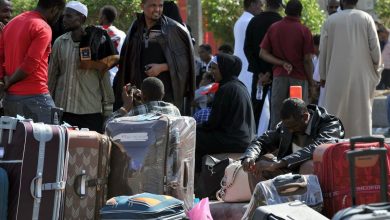Unofficial Saudi ban on Turkish exports hits fashion brands

An informal Saudi ban on Turkish products has hit the international fashion scene in the latest sign of escalating tensions between the two regional rivals.
The Financial Times (FT) reported on Monday that Spanish fashion brand Mango was reconsidering their Turkish suppliers due to an unofficial embargo by Saudi authorities.
An employee at the clothing giant told Turkish suppliers, in an email seen by the FT, that Riyadh had “banned all imports for made in Turkey products”.
In a statement, the Spanish company did not confirm a ban, but suggested that there have been issues with imports, saying that its teams “are looking into alternatives to the slowing down of custom processes for products of Turkish origin in Saudi Arabia”.
Mango is one of several European and US fashion retailers that have manufacturing sites in Turkey, including Sweden’s H&M and Britain’s Marks & Spencer, among others.
Mustafa Gultepe, head of the Istanbul Apparel Exporters’ Association (IHKIB), told FT that all retailers producing goods in Turkey for export to Saudi Arabia had been facing problems.
“We are talking about all global brands that have stores in Saudi Arabia, produce in Turkey and sell over there,” he said.
‘Negative repercussions’
Turkish exporters have for months complained that their products have been facing long delays at Saudi customs portals.
Fatih Gursoy, the chairman of the Turkey-Saudi Arabia Business Council, confirmed in July to MEE that Saudi authorities have been telephoning Saudi businesses on the issue.
But Saudi authorities have denied such claims, saying any trade delays being reported are the result of difficulties related to the coronavirus pandemic, and that the government had not “placed any restrictions on Turkish goods”.
On Saturday, however, eight Turkish business groups, including textile exporters and contractors, urged Saudi Arabia to improve trade relations between the two rivals.
“Any official or unofficial initiative to block trade between the two countries will have negative repercussions on our trade relations and be detrimental to the economies of both countries,” the companies warned.
“We deeply regret the discriminatory treatment that our companies face in Saudi Arabia… We expect Saudi authorities to take concrete initiatives to resolve the problems,” the statement continued.
One of the biggest textile producers in Europe and the Middle East, in 2019 IHKIB reported that Turkey had exported around $18bn worth of clothing that year alone.
At the time, Ankara had a trade surplus with Saudi Arabia last year, exporting $3.2bn worth of goods and services, while importing around $1.9bn.
‘Continued hostility’
Last year, Riyadh blocked the entrance of dozens of Turkish trucks carrying textile products and chemicals into the country while state-run media and leading business figures have advocated for boycotts of tourism and imports against Ankara.
While Saudi officials have denied claims that it has been blocking Turkish goods, earlier this month Ajlan al-Ajlan, the head of Saudi Arabia’s non-governmental Chamber of Commerce, on Twitter called for the government to set up an official boycott in response to “the continued hostility of the Turkish government against [Saudi Arabia’s] leadership, country and citizens”.
Relations between the two countries have been strained over competing regional interests, particularly in Libya, where the two back warring sides of the conflict.
Turkey has also backed Qatar, deploying troops to the small Gulf nation after Saudi Arabia and its allies launched an embargo against Doha in 2017.
Tensions reached new heights in 2018, when Turkish authorities revealed evidence that Saudi officials had assassinated and dismembered journalist Jamal Khashoggi at the Saudi consulate in Istanbul.





